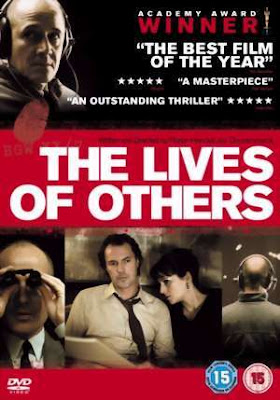"The Lives Of Others" - a wonderful film

I saw this for the 3rd time recently. It's a companion piece to Francis Ford Coppola's "The Conversation" (starring the ever wonderful Gene Hackman) but, I feel, with much more heart and soul than the aforementioned 1970's American film. It won the Oscar this year for Best Foreign Film in competition against such popular, critically acclaimed films as "Pan's Labyrinth" (Mexico), "Days Of Glory" (Algeria) and "After The Wedding" (Denmark). The film is at no. 59 in the all-time popularity ratings over at the Internet Movie Database (IMDB)
Ulrich Mühe's subtle, skillful central performance as Captain (Hauptmann) Wiesler in a role written for him was surely also deserving of an Oscar nod, but he was not even nominated. It has been seen by some as wishful thinking to suggest that such a devout, zealous defender of the socialist ideals of the East German Communist regime could go through such a conversion experience, but I feel the film effective shows the gradual nature of the conversion and is a testament to the potential for goodness in all of us.

After being asked by his boss to see a play by one of the few apparently loyal defenders of socialism amongst the East German literati, Georg Dreymann, Wiesler offers to set up surveillance on the writer's flat to see if he is as squeaky clean as he seems. But this request seems to be coloured by his fascination (crush?) with the lead actress in the play who happens to be the writer's live-in lover and muse, Christa-Maria Sieland.
So the conversion of this seemingly cold, hyper-efficient loner (whose spartan, undecorated flat contrasts with the book-filled warmth of Dreymann's own place) would seem to begin on a basic level by a thawing of the heart. However, the film steers away from "Peeping Tom"-style obsession and also from what could have become an expression of jealousy for the writer and his way of life. We begin to get signs that a deeper, more profound humanisation is occuring, most movingly so in one of the film's great moments.
**SPOILER ALERT** (although I won't give away evrything! :-)
A mentor and close friend of the Dreymann commits suicide days after having given the writer a present of a piece of piano music entitled "Sonata For A Good Man". Dreymann, obviously very upset, then sits down at the piano to play the piece in honour of his dead friend. Wielser, listening in upstairs, not only sheds a tear but his face is subtly transformed into a mask of pain (Mühe plays this so wonderfully well) that may contain a mixture of feelings: compassion, guilt and also maybe a sense of awakening... He is going to have to make a choice. One that will profoundly effect not just his own life but the lives of others (!).
Dreymann himself (in the aftermath of the death of his friend) also manages to move from a purely sentimental position to one of heroic action in the writing of a damning political tract that he manages to get smuggled out of the country and published in West Germany. And so the conversions of both men run in parallel. But it is that of Wiesler that dominates the subsequent drama.
The film's understated, gentle but incredibly moving ending has become one of my all-time favourites. The final freeze-frame on Capt. Wiesler's transfigured face (Mühe) as he accepts the indirect gift of the book's dedication (a book written by Dreymann in his honour, entitled "Sonata For A Good Man") says more about the untapped power for good within each of us than anything I know.
This is made all the more poignant by Mühe's subsequent death from stomach cancer within a few months of the film receiving its Oscar. He was a highly popular and respected veteran of German stage and screen, taking the lead role in a long running German TV thriller series. In "The Lives Of Others", art meets life in that Mühe himself was the object of East German Stasi surveillance during the 1980's.
Here is the English trailer for the film: slightly shorter than the US version and without the dialogue of the latter version which I feel gives away too much of the plot. I really do not like it when trailers basically give you a condensed version of the whole film.
Comments